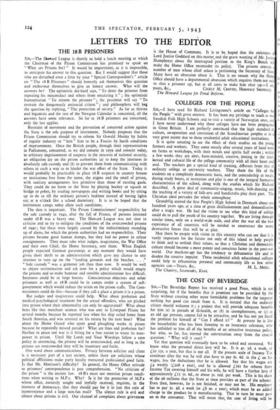COLLEGES FOR THE PEOPLE
Slit,—I have read Sir Richard Livingstone's article on "Colleges for the People " with great interest. It has been my privilege to teach at two Swedish Folk High Schools and to visit a variety of Norwegian ones, and I have never understood why these colleges have not been propagated in Great Britain. I am perfectly convinced •that the high standard of culture, co-operation and conviction of the Scandinavian peoples is to a very great extent due to these residential adult educational institutions.
It is quite amazing to see the effect of their studies on the young farmers and workers. They come mostly after several years of hard work on farms or workshops, with their minds and spirits half awake ; within a few weeks they are alert, keen-minded, creative, joining in the intel- lectual and cultural life of the college community with all their heart and soul. The teachers get a special kind of training, different from that of ordinary college or university teachers. They share the life of the students on a completely democratic basis, and the comradeship at meals, during study hours, at recreation and play is one of the integral formative characteristics of the school, along with the studies which Sir Richard described. A great deal of community-singing, music, folk-dancing and the teaching of a variety of folk-arts and handicrafts play their part. The Christian ideal pervades the whole atmosphere.
Grundriig started the first People's High School in Denmark about one hundred years ago, at a time of great disillusionment and demoralisation after a tragic war. He had the vision to see what this kind of college could do to pull the youth of his country together. We are living through similar times, only on a world-wide scale, and after the war all the best experience of all countries will be needed to counteract the many destructive forces that will be at play.
May there be people with vision in this country who can see that it is vastly important for the future not only of this island to help people to think and to rethink their values, so that a Christian and democratic culture should become a more potent and conscious factor in the post-war world. Our machine-age has the tendency to dehumanise life and to deaden the creative impulse. These residential adult educational colleges could help to rehumanise personal and community life as few other


























 Previous page
Previous page